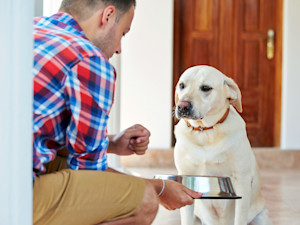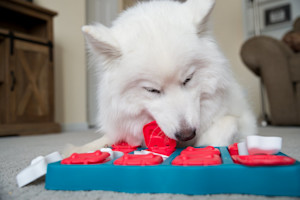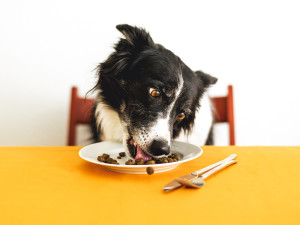Why Is Your Dog Always Hungry?
If your dog always seems hungry and is acting abnormally, there could be a problem.

Share Article
In This Article:
Why Is My Dog Suddenly Always Hungry? 10 Reasons Why Your Dog Could Be Hungry All The Time
Parents of food-motivated dogs are used to ignoring plaintive stares when preparing meals or sitting down to eat. But there’s a difference between looking for an opportunity for an extra snack and being desperate for anything that could be food.
We usually think about dogs having a decreased appetite when they’re sick, but could a dog be sick if they’re always hungry? If your dog always seems hungry and is acting abnormally, there could be a problem.
Why is my dog suddenly always hungry?
A sudden change in a dog’s appetite should always raise concerns for pet parents; A sudden increase in hunger might indicate a problem like an endocrine disorder, intestinal issue, medication side effect, or nutritional deficiency.

Whether increased or decreased, appetite can be a big indicator of a dog’s health status. Almost every serious illness causes a decrease in appetite, but a few can actually show up as an increased appetite, so it’s important to consult your vet if you notice a change.
10 reasons why your dog could be hungry all the time
The sensation of hunger comes from a complex interplay of signals from the pituitary gland, stomach, intestines, and fatty tissues. Hormones and nervous signals triggered by these body parts relay information to the brain about fullness and nutritional needs. Many health conditions can affect parts of this system and lead to increased feelings of hunger.
If your dog suddenly always seems hungry, it’s helpful to know if weight loss or gain accompanies the change in appetite. Some conditions that can cause increased hunger and weight gain in dogs include:
Cushing’s disease: In this condition, there is an overproduction of cortisol (steroid hormone) by the adrenal glands. In dogs, this usually occurs due to a tumor in the pituitary or one of the adrenal glands. Their increased appetite is often accompanied by other symptoms like increased thirst and urination, panting, and a pot-bellied appearance.
Sudden acquired retinal degeneration syndrome (SARDS): Dogs with acute vision loss due to rapid degeneration of their retinas often have increased hunger as well. The causes for SARDS in dogs are not well understood, but imbalances in endocrine hormones seem to be involved. These hormone imbalances can make a dog always seem hungry.
Low blood sugar: Toy breed puppies often have difficulty maintaining their blood sugar between meals due to a combination of a high metabolism and low energy stores in their muscle and fat. They should be fed small, frequent meals high in protein and complex carbohydrates to prevent their blood sugar from dropping. Older dogs can develop tumors that secrete insulin, which drives their blood sugar down. Having low blood sugar will send the body into a panic to try to ingest some nutrients.
Stress: Dogs can be stress eaters, too. Some stress hormones are the same ones that are involved in hunger signaling, so anxious dogs may be more demanding about food than most.
Medications: Certain medications can cause a marked increase in hunger. Two of the most common classes of drugs that will make dogs ravenous are corticosteroids (such as prednisone and dexamethasone) and anti-seizure medications (such as phenobarbital and potassium bromide). At higher doses, the hunger-related side effects of these drugs are bad enough that some dogs need to be switched to other medications.
Some issues that cause hunger in dogs can be accompanied by weight loss:
Diabetes mellitus: In dogs, diabetes primarily occurs due to a lack of insulin production. Insulin helps the body move nutrients, mainly glucose, from the bloodstream and into cells where it can be used for energy or stored for later. When a dog produces less insulin, such as with diabetes, higher amounts of glucose remain in the bloodstream instead of going into the cells where it can be used. Diabetic dogs will have very high blood sugar but little ability to produce energy from it. Their body thinks they’re starving because the nutrients aren’t making it to the cells that need them. Giving them insulin solves this problem and allows diabetic dogs to rebuild fat and muscle.
Gastrointestinal parasites: Worms and other parasites can steal nutrients directly from the intestinal tract and cause changes to the intestines that decrease the absorption of food. This double whammy hits puppies especially hard and can lead to constant hunger.
Exocrine pancreatic insufficiency (EPI): Exocrine pancreatic insufficiency (EPI): The pancreas secretes enzymes that break food down into molecules that can be absorbed by the intestines. In EPI, the pancreas doesn’t make enough of these enzymes, allowing that food to pass through the intestines largely undigested. Dogs with this condition seem to be starving despite eating constantly. Adding digestive enzymes to their food prior to feeding allows them to lead a normal life.
Increased energy demand: The nutritional needs of a canine athlete and a content lap-dog are markedly different. While most of our dogs aren’t burning the 10,000 to 15,000 calories per day that sled dogs do, a change in activity can lead to increased hunger. If your dog is training for an agility event or accompanying you on long runs, you’ll likely notice a big uptick in their appetite. Similarly, pregnant and nursing dogs will have increased hunger as their puppies rely on them for nutrition.
Poor diet or underfeeding: Poor diet or underfeeding: It’s hard to get canine nutrition just right, which is why I usually recommend feeding a good-quality commercial diet. While a veterinary nutritionist can help craft a balanced home-cooked meal for your dog, it’s easy to miss some vital nutrients when DIY-ing it. Incomplete nutrition can lead to constant hunger or pica.
Additionally, one of the simplest, non-medical explanations for constant hunger in a dog is underfeeding. Although most dog parents go in the opposite direction when scooping out meals, it’s possible to go too far with cutting calories when trying to keep your dog healthy. Work with your veterinarian to make sure your dog is being fed the correct amount of their specific diet. Different commercial dog foods can have varying caloric density, so it’s important to recalculate your dog’s needs if you switch diets — even within the same brand. Regular weigh-ins can help to make sure your dog is on the right track and catch weight loss or gain early.
When to take your dog to the vet
Although most dogs are always interested in food and happy to sneak an extra snack, a sudden change in the degree of hunger or excessively demanding food should be thought of as a potential problem. An increase in appetite could be an issue, especially if accompanied by other symptoms like weight gain or loss.
Bottom Line
Hunger is a normal feeling for dogs, especially if it’s been a while between meals. However, a sudden increase in your dog’s hunger could indicate a problem.
Be sure to see your vet any time you notice changes in your dog’s appetite, especially if it’s accompanied by weight loss, weight gain, or other signs.
References
Cook, Audrey K. “Abolishing Anorexia: The Physiology of Appetite Regulation.” Proceedings of the American College of Veterinary Internal Medicine Conference, 2016.
Gerth, Nadine et al. “Energy metabolism of Inuit sled dogs.” Journal of Comparative Physiology. B, Biochemical, systemic, and environmental physiology vol. 180,4 (2010): 577-89. https://link.springer.com/article/10.1007/s00360-009-0432-7opens in new tab
Komáromy, András M et al. “Sudden acquired retinal degeneration syndrome (SARDS) - a review and proposed strategies toward a better understanding of pathogenesis, early diagnosis, and therapy.” Veterinary ophthalmology vol. 19,4 (2016): 319-31. https://onlinelibrary.wiley.com/doi/10.1111/vop.12291opens in new tab

Dr. Bartley Harrison, DVM
Dr. Bartley Harrison is a veterinarian with more than 19 years of experience. He has treated a variety of species in emergency and speciality practices for both large and small animals. His primary interests as a vet are emergency medicine and critical care.
Related articles
![dog at interactive feeding station]()
5 Ways To Curb Your Dog’s Picky Eating
Just because “here comes the airplane” won’t work on dogs doesn’t mean you’re out of options.
![Side view of a cute hungry dog standing next to a red bowl with food in a studio with white background]()
How to Get a Dog to Eat
You can’t appease your picky new dog with chicken nuggets like you can with your toddler. Here are some things you can do.
Can Your Endlessly Hungry Dog Tell When They’re Full?
They seem to be bottomless pits, but something has to to tell them when to stop... right?
![A couple cooking in the kitchen while the guy feeds part of their meal to their Great Dane dog]()
How to Shop For Healthy, Eco-Friendly Ingredients to Feed Your Dog
From regenerative meats to low-carbon grains, these sustainable foods are fit for any conscious canine.
![Border Collie digging into a plate of dog food while seated at a yellow table]()
How You Can Easily Manage Your Dog’s Weight
Keep your pup’s weight down, and you could add years to their life. What’s better than that?
![Man kneeling and kissing the head of his white and tan dog on a wooden pier]()
Best Training Rewards for Your Dog
Positive reinforcement is in the eye of the beholder







